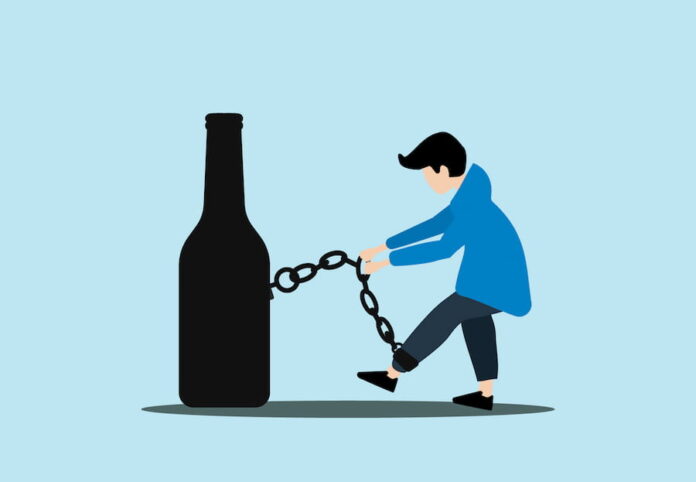What is alcohol abuse?
Alcohol abuse refers to drinking patterns that cause harm to one’s health, relationships, or ability to work. This includes binge drinking and chronic heavy drinking. Potential effects are liver disease, accidents, conflicts with loved ones, mental health issues like depression, and reduced life quality. Recognizing alcohol abuse early enables seeking help before consequences worsen.
Why it matters to get help early
Acknowledging alcohol’s negative life impacts often represents an important first step. Warning signs include increased drinking tolerance, withdrawal symptoms when sober, hiding consumption, and experiencing alcohol-fueled problems.
Overcoming denial through compassionate support enables healthier lifestyles via treatment options like therapy, recovery groups, and medical help. Prioritizing wellness early prevents worsening issues over time.
How alcohol addiction develops
Alcohol triggers the brain’s reward center, releasing “feel good” chemicals like dopamine. This activates reward/craving feedback loops – the more one drinks, the more the brain associates alcohol with pleasure. Over time, brain chemistry changes increase alcohol’s importance over other rewards.
Simultaneously, ongoing heavy alcohol use dulls natural dopamine production, reducing enjoyment of everyday sober activities. When drinking stops, spiking stress hormones and low dopamine provoke physical and psychological withdrawal distress. These dynamics perpetuate excessive drinking.
Recognizing the need for change
Increasing life impairment suggests alcohol misuse. Signs include:
– Escalated drinking tolerance
– Withdrawal symptoms when sober
– Hiding/lying about consumption
– Health issues, relationship conflicts, work/legal problems
Pursuing treatment assists positive coping skills rebuilding and expanding social support beyond alcohol. Consult a doctor, as medications can also help ease dependency during early sobriety’s challenges. Together, these tools empower sustainable wellbeing without alcohol dependence.
The connection between alcohol addiction and mental health
Alcohol abuse and mental health disorders often worsen each other. Those struggling with one have higher risks of developing the other. For example, excessive drinking can exacerbate conditions like depression and anxiety partly through impacting brain chemistry.
Some also self-medicate existing mental health issues with heavy alcohol use. This spiral enables a vicious cycle where both addiction and mental health disorders grow increasingly severe.
Warning signs of concurrent issues include extreme mood changes, social withdrawal, neglected responsibilities, and an inability to reduce problem drinking. Integrated treatment addressing mental health and substance use components together disrupts this destructive linkage most effectively.
An integrated approach may involve dual diagnosis therapy, support groups, medication management, and learning healthier coping strategies. Building a sense of purpose and community support aids long-term wellness maintenance.
If you notice warning signs of co-occurring alcohol addiction and mental health issues, compassionately urge your loved one to seek help through their doctor or treatment specialists. Small steps today enable brighter times ahead.
Did you find this helpful? Check out our other helpful articles on our website.
Read Also
- Achieving a Defined, Balanced Facial Contour in SingaporeA well-defined jawline and a gently tapered lower face — commonly referred to as a V-shaped face — is a look many people aspire to. In Singapore’s beauty and aesthetic scene, treatments that help refine facial contours have grown in popularity as more individuals seek subtle, natural enhancements that boost confidence and balance facial features.… Read more: Achieving a Defined, Balanced Facial Contour in Singapore
- The Wellness Blueprint: How Your DNA Holds the AnswerGenetic testing is revolutionizing preventive healthcare by offering insights into individual health risks. By analyzing DNA, these tests provide a personalized health blueprint that can guide lifestyle and medical decisions. This approach, often referred to as DNA wellness testing, helps to optimize health naturally and prevent potential diseases. In recent years, genetic testing has become… Read more: The Wellness Blueprint: How Your DNA Holds the Answer
- Exploring the Benefits of Infusion Therapy in OKC: The Ultimate GuideUnderstanding Infusion Therapy: A Deep Dive into Its Purpose and Process What exactly is Infusion Therapy? Infusion therapy is an advanced medical treatment that delivers medication and nutrients directly into the bloodstream through a vein, typically via an IV (intravenous) line. This method is particularly beneficial for patients who require a concentrated dose of medication,… Read more: Exploring the Benefits of Infusion Therapy in OKC: The Ultimate Guide
- Ketamine-Assisted Therapies: Impacts on Employee WellbeingWorkplace stress is common today. Many employees feel tired, anxious, or burned out. Regular therapy can help, but some people need more support. Ketamine-assisted therapy is showing good results for mental health. A ketamine-assisted therapist guides each session safely. This therapy can improve mood, focus, and energy. Learning more about it can help teams stay… Read more: Ketamine-Assisted Therapies: Impacts on Employee Wellbeing
- The Future of Men’s Health: Why Telehealth Is Here to StayTelehealth isn’t just a pandemic trend that faded into the background. For Australian men, it has become one of the most practical, time-saving, and stress-free ways to manage everyday health — and it’s shaping the future of how we access care. Platforms like DOCTO, an Australian online doctor and specialist telehealth service, are leading the… Read more: The Future of Men’s Health: Why Telehealth Is Here to Stay
- How to Build a Simple, Clean Skincare Routine ?You don’t need a complicated skincare routine. It doesn’t have to be something that requires twenty different products and confusing steps. Your routine works well with just a few high-quality clean ingredients. The beauty industry keeps pushing more products, but your skin actually needs less. You only need a simple approach to get better results… Read more: How to Build a Simple, Clean Skincare Routine ?
- How Preventive Dental Care Supports Overall HealthHave you ever wondered how a simple dental checkup could impact your entire body? Oral health is more than just a bright smile. Studies show that poor dental habits can contribute to serious health problems. Gum disease and tooth decay are linked to heart disease, diabetes, and infections. Yet, many people overlook preventive dental care.… Read more: How Preventive Dental Care Supports Overall Health
- Seeing Clearly in a High-Tech World: A Deep Dive into Advanced Vision Care ServicesProtecting your eyesight isn’t optional—it’s essential. Modern eye care has evolved far beyond basic exams, offering advanced diagnostics, personalized treatments, and surgical innovations that keep vision sharp for life. A leading example is Intermountain Eye Center, home to specialists like Dr Fishburn Boise, where patients receive comprehensive, high-level vision care designed to preserve long-term eye… Read more: Seeing Clearly in a High-Tech World: A Deep Dive into Advanced Vision Care Services









